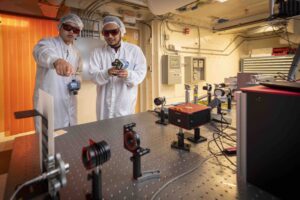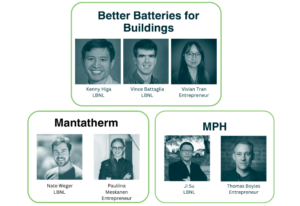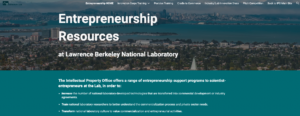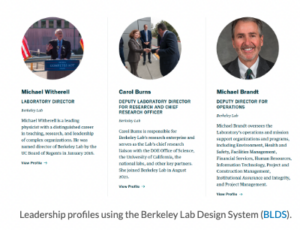
Message from Carol
Dear Colleagues:
In the last issue of Research News, I shared some of the ways the Lab is mindfully shaping how science is done, such as our multidisciplinary and transdisciplinary approaches to science and the use of computational tools such as artificial intelligence and machine learning.
This issue continues the discussion of how we are revolutionizing science through the development of first-of-a-kind scientific tools. We also take a look at how one of our user facilities, the Joint Genome Institute, is helping to advance genomics in support of the DOE’s energy and environment-related missions.
Of course, revolutionizing science often means sharing ideas and collaborating. I encourage you to fill in your Lab web profile so that others at the Lab may more fully understand your background and work experience. My hope is that access to this information will encourage connections, conversations, and collaborations.
Our role as a national laboratory offers both the opportunity and the responsibility to conduct world-leading science. The impact of this science is seen in the knowledge and technology that result, and in the ways we make a difference in the careers of future generations of scientists. Below you can read about opportunities to make a difference, from mentoring young scientists at minority-serving institutions to supporting the transfer of Lab technologies.
Sincerely,
Carol Burns
Deputy Laboratory Director for Research
Chief Research Officer

Revolutionizing Science with First-of-its-Kind Scientific Tools at the Lab
One of the important ways Berkeley Lab has revolutionized science is its development of first-of-its-kind scientific tools. Today, scientists at the Lab continue to develop new tools every day, sometimes in service of their own research, and then realize that the tools themselves may be valuable to other researchers.
Read about three examples of tools developed at the Lab: a drop-on-tape method for the efficient and accurate probing of liquid samples, a tool to bypass chip failures, and a cold microscope.

The Joint Genome Institute Looks to the Future: A Q&A with Nigel Mouncey
Like Berkeley Lab’s other cutting-edge user facilities, the Joint Genome Institute (JGI) is helping to transform science. When it was established 26 years ago, it focused on sequencing for the Human Genome Project. Since then, it has evolved to advance genomics in support of the DOE missions related to clean energy and the environment.
Research News spoke with Nigel Mouncey, who joined the Lab in 2017 as the Institute’s director, about the JGI’s plans and what makes the institute special.

The Office of National and Homeland Security: Uncovering Opportunities for Berkeley Lab
The Office of National and Homeland Security (ONHS) transitioned from the Physical Sciences Area to the Lab Directorate in the fall of 2020, reporting to the Deputy Lab Director for Research. The transition was made to better support opportunities across the Lab with the nation’s security agencies, which include the Department of Defense (DoD), Department of Homeland Security (DHS), the DOE’s National Nuclear Security Administration (NNSA), and the intelligence community.
Read about some new opportunities it has helped uncover for the Lab and meet Shawn Tornga, ONHS’s new program manager who is supporting opportunities related to nuclear nonproliferation.

NNSA Internship Program at Minority Service Institutions – Register for Informational Sessions this Fall
The National Nuclear Security Administration Minority Serving Institutions Internship Program (NNSA-MSIIP) provides paid internship opportunities for undergraduate and graduate students enrolled at minority-serving institutions. It offers summer or year-long internship opportunities with the national laboratories, NNSA, and site offices.
Hear from Qiang Chen, a research scientist at the Berkeley Lab Laser Accelerator (BELLA) Center in the Accelerator Technology & Applied Physics (ATAP) Division of the Physical Sciences Area, and from his intern Bryan Alamillo, about their experience as mentor and intern (respectively) this past summer.

Cradle to Commerce Selects 2023 Cohort
Cradle to Commerce (C2C), an incubator initiative across four national labs funded by the Department of Energy’s Office of Technology Transitions, has announced the selection of its 2023 cohort. C2C matched each Lab team with external entrepreneurs. Congratulations to the Energy Technologies Area’s Better Batteries for Buildings team (Kenny Higa, Vince Battaglia, matched with external entrepreneur Vivian Tran), the MPH team (Ji Su, matched with external entrepreneur Thomas Boyles), and the Mantatherm team (Lab affiliate researcher Nate Weger matched with external industry partner Pauliina Meskanen).

Cyclotron Road Seeks Reviewers for Applications and Finalist Competition
Would you like to help the Berkeley Lab support early stage companies on a mission to change the world? Berkeley Lab’s Cyclotron Road is seeking reviewers to help select its Cohort 2024. The program seeks experts to review two-page proposals in selected technical domains (Dec 1 – 15, 2023) and to participate in a virtual finalist competition (scheduled pitch sessions during Feb 27 – Mar 3, 2024). The time commitment is only a few hours and would be an excellent way to contribute to Berkeley Lab’s Lab-Embedded Entrepreneurship Program. Plus, by participating in these events, researchers may find that they would like to become a mentor or collaborator of one of the selected Cyclotron Road fellows. Applications may cover a wide range of energy technology areas including:
-
Advanced materials
-
Improving manufacturing efficiency
-
Industrial decarbonization
-
Lowering building carbon and energy footprints
-
Solar energy
-
Quantum computing
-
Energy storage for supporting the electric grid
-
Circularity (circular economy)
-
Food, water, energy nexus
-
Carbon dioxide removal
-
Carbon capture, utilization and storage
Contact Tom Kirchstetter or Melanie Sonsteng for more information.

IPO Launches Entrepreneurship Resources Mini-site
Berkeley Lab’s Intellectual Property Office has launched a mini-website offering information about entrepreneurship training, events, and resources. Learn about I-Corps Lite training, an upcoming pitch competition, postdoc entrepreneurship training, the Cradle to Commerce program, and more.
NEED TO KNOW
Know Your Collaborators: The Importance of Restricted Party Screening and your Role
In our mission to bring scientific solutions to the world, open collaborations play a vital role. At the same time, we also need to be mindful that an increasing number of institutions are subject to regulations. The Restricted Party Screening (RPS) tool helps us understand with whom we are collaborating, to safeguard national security and to prevent the unauthorized transfer of sensitive technologies and materials to restricted institutions or individuals.
Discover, Collaborate, Excel: Complete Your Berkeley Lab Profile

Lab staff web profiles aggregate data from multiple systems to build a comprehensive picture of our organization. Creating a complete and engaging profile helps you present a professional and strategic Lab online presence. Make it a priority to complete your profile and build enriching connections around the world.

